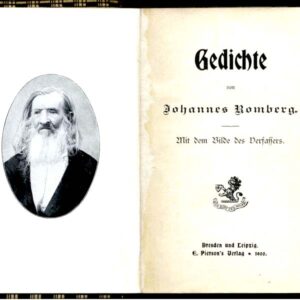
Four copies of Prairie Blume collection survive and are housed in the University of Texas archives. They were found in the papers of Johannes Christlieb Nathanael Romberg (1808 -1891) who was active in the group. Romberg is generally considered to be the most outstanding German-Texan poet and is among the notable German American poets.
Wrapped in the New Yorker Staatszeitung dated February 23, 1861, these sixteen sheets sewn together by white thread consist equally of poems and short stories. They reveal the narrative of the thoughts, hopes, and dreams of aspiring writers.
Being locked away from society during the height of COVID gave me a true appreciation of how these early pioneers must have felt about the monotony of their days, performing the same mundane farm and house chores repeatedly. The starvation for entertainment and mental stimulation must have been intense. Can you imagine moving from Germany where cities and universities flourished to a place where you cannot see or hear your neighbors? Fortunately, this Texas Literary Society filled that need.
The group, composed of both men and women, met Sundays every four weeks at members’ homes. The literary program was first, followed by refreshments, and entertainment, perhaps music, games, or dancing. Those coming from a distance would spend the night.
The topic for the writing was generally agreed on prior to the meeting. If the piece was submitted early enough, it was recopied so that the identity of the writer was unknown. As in most writing groups, the skills and abilities varied widely, but all were welcome. Romberg mentored the young members through example, suggestion, and encouragement. At times, he rewrote materials from less experienced writers to be reread at the next meeting, demonstrating an alternative way of presenting an idea.
What did they write about? Many of the same things we write about today:
Humorous events, going on a journey, the changing moods of the landscape, the destructive side of mother nature, the awe-inspiring wonder of the stars. They explored the contrasts of the social and political conditions of Germany and Texas as well as philosophized about the meaning of life and laws that explained the universe. Then, too, their writing focused on activities no longer popular such as horseback riding and hunting duck, deer, and bears.
Sadly, the Civil War interrupted their moment in the sun. The group gradually faded away as the community became consumed by the stresses and horrors of war.
Writing is often considered a solitary process. But without the mentoring, encouragement, and cheerleading the literary community provides, our work is likely to become stale and uninteresting. Giving up becomes a real option.
Did we lose important works of literature when the Prairie Blume Literary Society ceased to exist? We’ll never know. However, supporting fellow writers is imperative if we are to see the written word flourish.
Sign up on www.mariewatts.com to receive future Stories About Life delivered to your email address or read more stories by clicking here.

Recent Comments